《关于争端解决规则和程序的谅解书》(英文)
关于争端解决的规则与程序的谅解
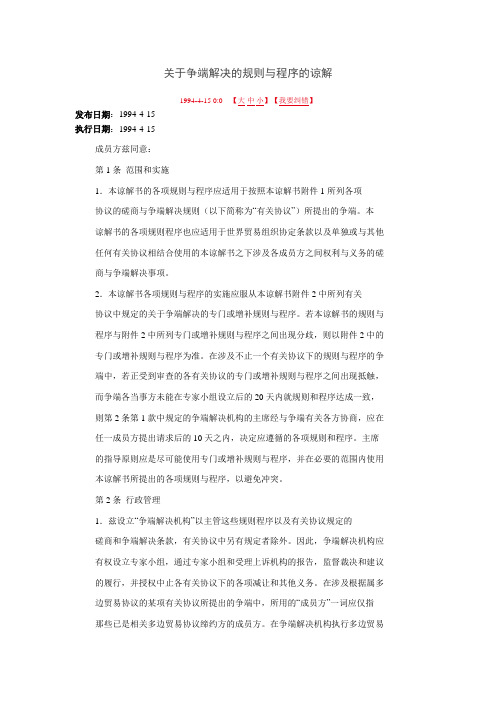
关于争端解决的规则与程序的谅解1994-4-15 0:0【大中小】【我要纠错】发布日期:1994-4-15执行日期:1994-4-15成员方兹同意:第1条范围和实施1.本谅解书的各项规则与程序应适用于按照本谅解书附件1所列各项协议的磋商与争端解决规则(以下简称为“有关协议”)所提出的争端。
本谅解书的各项规则程序也应适用于世界贸易组织协定条款以及单独或与其他任何有关协议相结合使用的本谅解书之下涉及各成员方之间权利与义务的磋商与争端解决事项。
2.本谅解书各项规则与程序的实施应服从本谅解书附件2中所列有关协议中规定的关于争端解决的专门或增补规则与程序。
若本谅解书的规则与程序与附件2中所列专门或增补规则与程序之间出现分歧,则以附件2中的专门或增补规则与程序为准。
在涉及不止一个有关协议下的规则与程序的争端中,若正受到审查的各有关协议的专门或增补规则与程序之间出现抵触,而争端各当事方未能在专家小组设立后的20天内就规则和程序达成一致,则第2条第1款中规定的争端解决机构的主席经与争端有关各方协商,应在任一成员方提出请求后的10天之内,决定应遵循的各项规则和程序。
主席的指导原则应是尽可能使用专门或增补规则与程序,并在必要的范围内使用本谅解书所提出的各项规则与程序,以避免冲突。
第2条行政管理1.兹设立“争端解决机构”以主管这些规则程序以及有关协议规定的磋商和争端解决条款,有关协议中另有规定者除外。
因此,争端解决机构应有权设立专家小组,通过专家小组和受理上诉机构的报告,监督裁决和建议的履行,并授权中止各有关协议下的各项减让和其他义务。
在涉及根据属多边贸易协议的某项有关协议所提出的争端中,所用的“成员方”一词应仅指那些已是相关多边贸易协议缔约方的成员方。
在争端解决机构执行多边贸易协议的争端解决规定时,只有身为该协议缔约方的那些成员方才可参与争端解决机构对该争端所采取的决定或行动。
2.争端解决机构应向世界贸易组织的有关理事会和委员会通报与各有关协议条款相关的各项争端的进展情况。
法律英语(通用版)-7.+争议解决-中英互译2
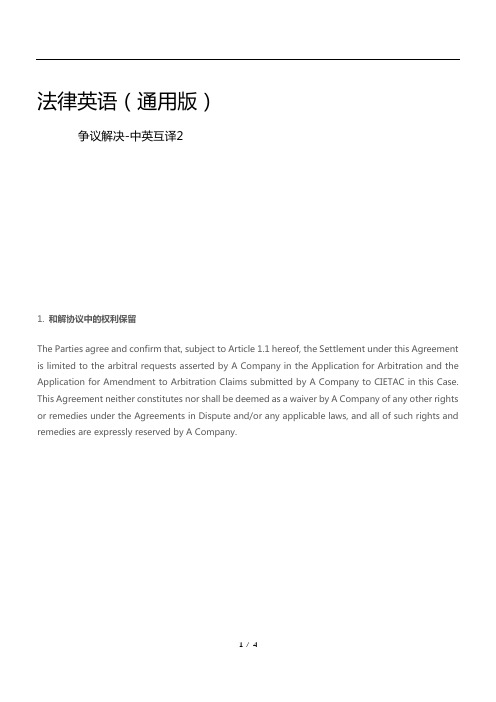
法律英语(通用版)1.和解协议中的权利保留The Parties agree and confirm that, subject to Article 1.1 hereof, the Settlement under this Agreement is limited to the arbitral requests asserted by A Company in the Application for Arbitration and the Application for Amendment to Arbitration Claims submitted by A Company to CIETAC in this Case. This Agreement neither constitutes nor shall be deemed as a waiver by A Company of any other rights or remedies under the Agreements in Dispute and/or any applicable laws, and all of such rights and remedies are expressly reserved by A Company.2. 和解协议——违约后果Notwithstanding the other provisions of this Agreement, if A Company fails to pay and ensure B Company’s receipt of the Settlement Payment fully and timely in accordance with this Agreement and/or breaches other provisions of this Agreement, B Company shall be entitled to any rights and remedies under the Contract and/or any applicable laws, including without limitation the right to claim for the liquidated damages equaling 20% of the total price of the Contract, and shall be entitled to take any further actions including without limitation legal actions to exercise such rights and to seek for such remedies. This Agreement is a supplement to the Contract. Unless expressly indicated otherwise in this Agreement, neither the signing nor the performance of this Agreement shall impact the agreements under the Contract in any way.3. 仲裁代理意见的引述内容With respect to the captioned case (the“Case”), we participated in the arbitration proceedings of the Case as agents ad litem of the Claimant1, and attended the hearing and presented evidence and arguments on behalf of the Claimant on August 1, 2000. On the basis of the evidence and arguments we have presented in the Case, we hereby further submit this Post-hearing Statement in writing. We submit that each claim raised by the Claimant has sufficient legal and contractual grounds as well as factual basis, while the Respondent’s defenses lack legal, contractual and factual foundations; and therefore, each and every claim raised by the Claimant shall be upheld by the Tribunal. Please find more details as follows:1 Unless otherwise defined, the definitions used in this document shall have the same meaning as defined in the Application for Arbitration dated 1 April 2000.4. 仲裁程序授权委托书的权限描述1)To attend arbitration hearings and express opinions;2)To propose and negotiate with the Respondent about settlement terms and conditions, to participate in the conciliation conducted by the arbitral tribunal;3)To correspond with CIETAC and other parties of or related to this Case; and4)To exercise the powers and rights of the Principal under any applicable laws, regulations and the arbitration rules of CIETAC, or take any other appropriate actions for the benefit of the Principal in or in connection with this Case.。
DSU《关于争端解决规则与程序的谅解》概述
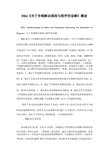
DSU《关于争端解决规则与程序的谅解》概述DSU(Understanding on Rules and Procedures Governing the Settlement of Disputes)关于争端解决规则与程序的谅解DSU系关于争端解决规则与程序的谅解的英文缩写。
《关于争端解决规则与程序的谅解》是世界贸易组织管辖的一项多边贸易协议。
它是在关贸总协定1979年通过的《关于通知、磋商、争端解决和监督的谅解》的基础上修改的,有27条和4个附件。
主要条款有:范围和适用,管理,总则,磋商,斡旋、调解和调停,专家组(设立、职权范围、组成、职能、程序),多个起诉方的程序,第三方,寻求信息的权利,机密性,中期审议阶段,专家组报告的通过,上诉机构,争端解决机构决定的时限,对执行建议和裁决的监督,补偿和中止减让,多边体制的加强,涉及最不发达国家成员的特殊程序,仲裁,非违反起诉等条款。
主要内容有:1、规定了争端解决的范围、实施及管理;2、规定了争端解决的原则精神;3、规定了以保证世界贸易组织规则的有效实施为争端解决的优先目标;4、规定了解决争端的方法;5、规定了严格的争端解决时限;6、规定实行“反向协商一致”的决策原则;7、规定禁止未经授权的单边报复;8、规定允许交叉报复。
《争端解决谅解》的宗旨是为争端寻求积极的解决办法,保障多边贸易体系的可靠性和可预见性。
WTO根据《争端解决谅解》设立了争端解决机构。
附件1为《由本谅解涉及的各个协议》;附件2为《各有关协议中的专门或附加的规则和程序》;附件3为专家组解决争端的《工作程序》;附件4为《专家审议小组》,规定了专家审议小组的组成、工作规则及程序。
一、DSU的主要内容该谅解书共27条,另有4个附件,分别规定了世贸组织争端解决机制的适用与范围、管理与运作、一般原则、基本程序、建议与裁决的实施和监督、补偿与转让的中止、涉及最不发达成员国的特殊程序、专家组的工作程序、专家复审等内容,与原来的GATT体制下的规定相比,该谅解书在多处都有了明显的进步。
法律专业术语英汉互译
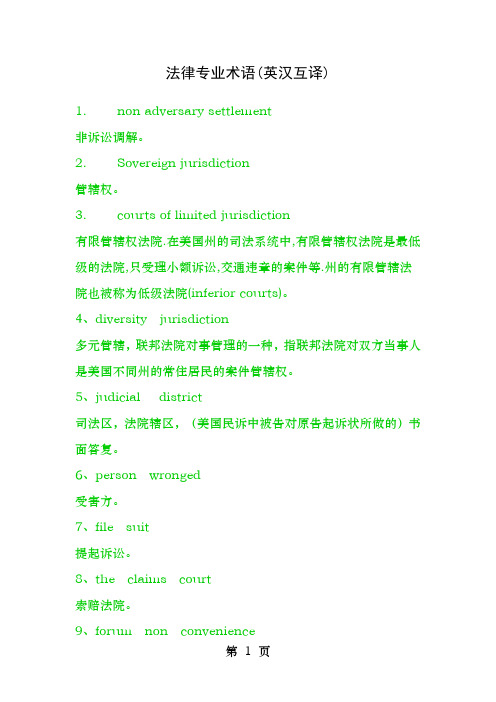
法律专业术语(英汉互译)1. non adversary settlement非诉讼调解。
2. Sovereign jurisdiction管辖权。
3. courts of limited jurisdiction有限管辖权法院.在美国州的司法系统中,有限管辖权法院是最低级的法院,只受理小额诉讼,交通违章的案件等.州的有限管辖法院也被称为低级法院(inferior courts)。
4、diversity jurisdiction多元管辖,联邦法院对事管理的一种,指联邦法院对双方当事人是美国不同州的常住居民的案件管辖权。
5、judicial district司法区,法院辖区,(美国民诉中被告对原告起诉状所做的)书面答复。
6、person wronged受害方。
7、file suit提起诉讼。
8、the claims court索赔法院。
9、forum non convenience[拉]不方便审理得法院,指若法院认为案件由另一法院审理对双方当事人更为方便且能达到上述的目的,可不予受理。
10、code pleading法典诉答程序,指依照法典确定的规则而进行的诉答,始于1848年美国纽约洲菲尔德法典(Field Code)的规定。
11、qualified denial有限的否定,指被告在答辩中对原告的主张因缺乏确定性而不足以作出答辩的否认。
12、Party joiner当事人的合并,制将具有相同权利的多人或对提出同样权利请求的多人合并为一件诉讼的共同原告或共同被告。
13、Cross complaints交叉诉状,指本诉被告自本诉当事人以外第三人就其与本诉有关的事项提起诉讼的诉状。
14、mistrial无效审判。
15、deposition宣誓证词;证言。
16、counterclaims反诉,指在已开始的诉讼中的被告通过法院向本案原告提出的一项独立的请求,以代替就该请求对原告另外提起的一项单独的诉讼。
17、cross-examination交叉询问,指开庭审理程序中,一方当事人对对方证人所进行的询问。
谅解备忘录(中英文)

DATED[日期][PARTY A NAME][甲方名称]AND与[PARTY B NAME][乙方名称]MEMORANDUM OF UNDERSTANDING谅解备忘录This Memorandum of Understanding (“MOU”) is entered into on [date] by and between [Party A name], [Party A entity form] established and existing under the laws of China, with its legal address at [address] (hereinafter referred to as “Party A”), and [Party B name], [Party B entity form] organized and existing under the laws of [Party B jurisdiction of incorporation] with its leg al address at [address] (hereinafter referred to as “Party B”). Party A and Party B shall hereinafter be referred to individually as a “Party ” and collectively as the “Parties”.本谅解备忘录(“本备忘录”)于[日期]由以下双方签订:[甲方名称],一家根据中国法律成立并存续的[甲方组织形式],法定地址位于[甲方法定地址](以下简称“甲方”):与[乙方名称],一家根据[乙方所在国]法律成立并存续的[乙方组织形式],法定地址位于[乙方法定地址](以下简称“乙方”)。
甲方和乙方以下单独称为“一方”,合称为“双方”。
关于争端解决规则与程序的谅解
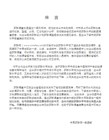
3.在一成员认为其根据适用协定直接或间接获得的利益正在因另一成员采取的措施而减损的情况下,迅速解决此类情况对WTO的有效运转及保持各成员权利和义务的适当平衡是必要的。
4.DSB所提建议或所作裁决应旨在依照本谅解和适用协定项下的权利和义务,实现问题的满意解决。
5.对于根据适用协定的磋商和争端解决规定正式提出的事项的所有解决办法,包括仲裁裁决,均与这些协定相一致,且不得使任何成员根据这些协定获得的利益丧失或减损,也不得妨碍这些适用协定任何目
2.DSB应通知WTO有关理事会和委员会任何与各自适用协定规定有关的争端的进展情况。
3.DSB应视需要召开会议,以便在本谅解规定的时限内行使职能。
4.如本谅解的规则和程序规定由DSB作出决定,则DSB应经协商一致作出决定。(注1) 注1:如在作出决定的DSB会议上,没有成员正式反对拟议的决定,则DSB即被视为经协商一致就提请其审议的事项作出决定。
2.本谅解的规则和程序的适用应遵守本谅解附录2所确定的适用协定所含特殊或附加规则和程序。在本谅解的规则和程序与附录2所列特殊或附加规则和程序存在差异时,应以附录2中的特殊或附加规则和程序为准。在涉及一个以上适用协定项下的规则和程序的争端中,如审议中的此类协定的特殊或附加规则和程序之间产生抵触,且如果争端各方在专家组设立20天内不能就规则和程序达成协议,则第2条第1款中规定的争端解决机构(本谅解中称“DSB”)主席,在与争端各方磋商后,应在两成员中任一成员提出请求后10天内,确定应遵循的规则和程序。主席应按照以下原则,即在可能的情况下使用特殊或附加规则和程序,并应在避免抵触所必需的限度内使用本谅解所列规则和程序。
马拉喀什建立世界贸易组织协定——附件2:关于争端解决规则与程序的 谅解 各成员特此协议如下:
WTO关于争端解决规则与程序的谅解
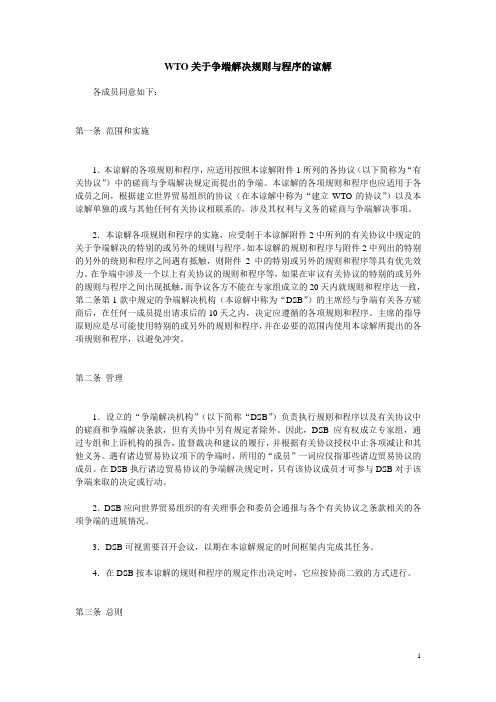
WTO关于争端解决规则与程序的谅解各成员同意如下:第一条范围和实施1.本谅解的各项规则和程序,应适用按照本谅解附件1所列的各协议(以下简称为“有关协议”)中的磋商与争端解决规定而提出的争端。
本谅解的各项规则和程序也应适用于各成员之间,根据建立世界贸易组织的协议(在本谅解中称为“建立WTO的协议”)以及本谅解单独的或与其他任何有关协议相联系的,涉及其权利与义务的磋商与争端解决事项。
2.本谅解各项规则和程序的实施,应受制于本谅解附件2中所列的有关协议中规定的关于争端解决的特别的或另外的规则与程序。
如本谅解的规则和程序与附件2中列出的特别的另外的统则和程序之间遇有抵触,则附件2中的特别或另外的规则和程序等具有优先效力。
在争端中涉及一个以上有关协议的规则和程序等,如果在审议有关协议的特别的或另外的规则与程序之间出现抵触,而争议各方不能在专家组成立的20天内就规则和程序达一致,第二条第1款中规定的争端解决机构(本谅解中称为“DSB”)的主席经与争端有关各方磋商后,在任何一成员提出请求后的10天之内,决定应遵循的各项规则和程序。
主席的指导原则应是尽可能使用特别的或另外的规则和程序,并在必要的范围内使用本谅解所提出的各项规则和程序,以避免冲突。
第二条管理1.设立的“争端解决机构”(以下简称“DSB”)负责执行规则和程序以及有关协议中的磋商和争端解决条款,但有关协中另有规定者除外。
因此,DSB应有权成立专家组,通过专组和上诉机构的报告,监督裁决和建议的履行,并根据有关协议授权中止各项减让和其他义务。
遇有诸边贸易协议项下的争端时,所用的“成员”一词应仅指那些诸边贸易协议的成员。
在DSB执行诸边贸易协议的争端解决规定时,只有该协议成员才可参与DSB对于该争端来取的决定或行动。
2.DSB应向世界贸易组织的有关理事会和委员会通报与各个有关协议之条款相关的各项争端的进展情况。
3.DSB可视需要召开会议,以期在本谅解规定的时间框架内完成其任务。
Unit4课文翻译素材-高中英语牛津译林版(2020)选修第二册
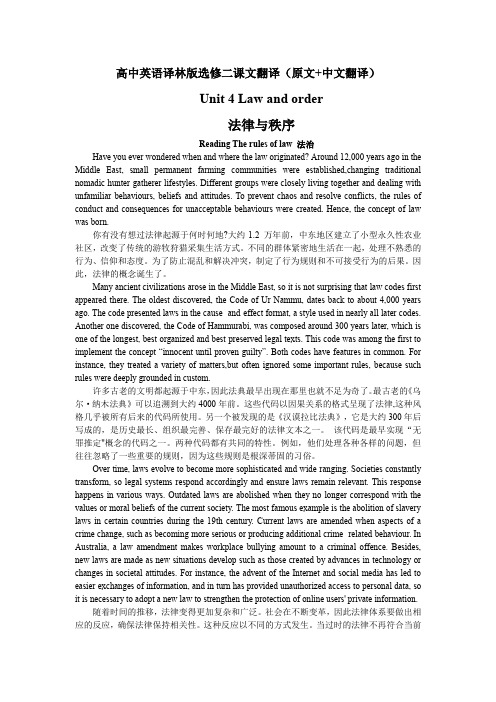
高中英语译林版选修二课文翻译(原文+中文翻译)Unit 4 Law and order法律与秩序Reading The rules of law 法治Have you ever wondered when and where the law originated? Around 12,000 years ago in the Middle East, small permanent farming communities were established,changing traditional nomadic hunter-gatherer lifestyles. Different groups were closely living together and dealing with unfamiliar behaviours, beliefs and attitudes. To prevent chaos and resolve conflicts, the rules of conduct and consequences for unacceptable behaviours were created. Hence, the concept of law was born.你有没有想过法律起源于何时何地?大约1.2 万年前,中东地区建立了小型永久性农业社区,改变了传统的游牧狩猎采集生活方式。
不同的群体紧密地生活在一起,处理不熟悉的行为、信仰和态度。
为了防止混乱和解决冲突,制定了行为规则和不可接受行为的后果。
因此,法律的概念诞生了。
Many ancient civilizations arose in the Middle East, so it is not surprising that law codes first appeared there. The oldest discovered, the Code of Ur-Nammu, dates back to about 4,000 years ago. The code presented laws in the cause -and-effect format, a style used in nearly all later codes. Another one discovered, the Code of Hammurabi, was composed around 300 years later, which is one of the longest, best-organized and best-preserved legal texts. This code was among the first to implement the concept “innocent until proven guilty”. Both codes have features in common. For instance, they treated a variety of matters,but often ignored some important rules, because such rules were deeply grounded in custom.许多古老的文明都起源于中东,因此法典最早出现在那里也就不足为奇了。
论WTO争端解决机制的“第三方”制度(一)
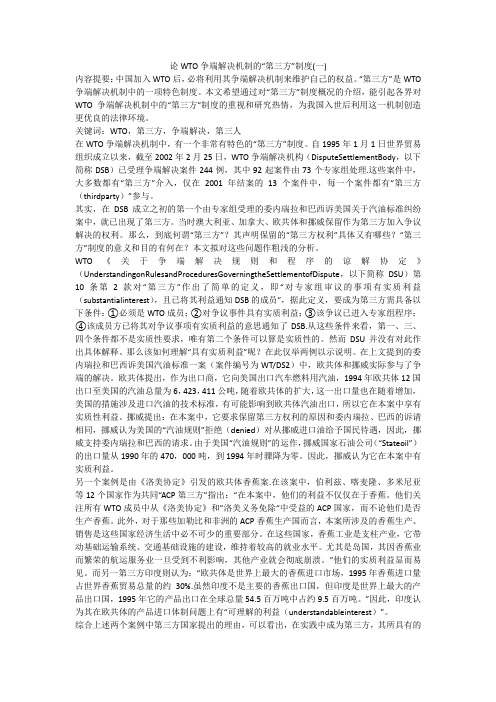
论WTO争端解决机制的“第三方”制度(一)内容提要:中国加入WTO后,必将利用其争端解决机制来维护自己的权益。
“第三方”是WTO 争端解决机制中的一项特色制度。
本文希望通过对“第三方”制度概况的介绍,能引起各界对WTO争端解决机制中的“第三方”制度的重视和研究热情,为我国入世后利用这一机制创造更优良的法律环境。
关键词:WTO,第三方,争端解决,第三人在WTO争端解决机制中,有一个非常有特色的“第三方”制度。
自1995年1月1日世界贸易组织成立以来,截至2002年2月25日,WTO争端解决机构(DisputeSettlementBody,以下简称DSB)已受理争端解决案件244例,其中92起案件由73个专家组处理.这些案件中,大多数都有“第三方”介入,仅在2001年结案的13个案件中,每一个案件都有“第三方(thirdparty)”参与。
其实,在DSB成立之初的第一个由专家组受理的委内瑞拉和巴西诉美国关于汽油标准纠纷案中,就已出现了第三方。
当时澳大利亚、加拿大、欧共体和挪威保留作为第三方加入争议解决的权利。
那么,到底何谓“第三方”?其声明保留的“第三方权利”具体又有哪些?“第三方”制度的意义和目的有何在?本文拟对这些问题作粗浅的分析。
WTO《关于争端解决规则和程序的谅解协定》(UnderstandingonRulesandProceduresGoverningtheSettlementofDispute,以下简称DSU)第10条第2款对“第三方”作出了简单的定义,即“对专家组审议的事项有实质利益(substantialinterest),且已将其利益通知DSB的成员”,据此定义,要成为第三方需具备以下条件:①必须是WTO成员;②对争议事件具有实质利益;③该争议已进入专家组程序;④该成员方已将其对争议事项有实质利益的意思通知了DSB.从这些条件来看,第一、三、四个条件都不是实质性要求,唯有第二个条件可以算是实质性的。
关于争端解决规则与程序的谅解.
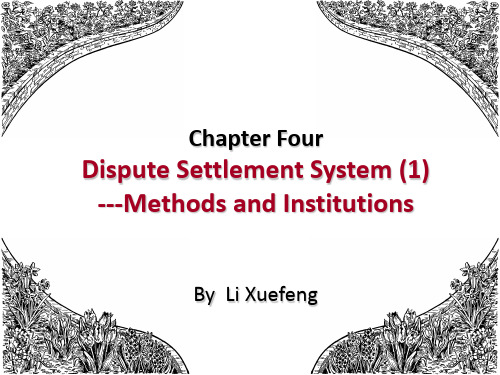
DSU
Introdu Methods -ction
Institu -tions
Proceed -ings
Case study
Challenges & Reform
I. Introduction
coverage innovations principles
Agreemen ts & Exceptions
• An exception: • Where there is a difference between the rules and procedures of DSU and the special or additional rules and procedures set forth in the agreements above, the special or additional rules and procedures shall prevail.
II. Dispute Settlement Methods
Dispute resolution methods compared
• ---- through consultations (Article 4 of the DSU); • ----through good offices, conciliation and mediation (Article 5 of the DSU); • ----through adjudication by ad hoc panels and the Appellate Body (Articles 6 to 20 of the DSU) • ---- through arbitration (Article 25 of the DSU).
关于解决国家和他国国民之间投资争端公约(中英文)
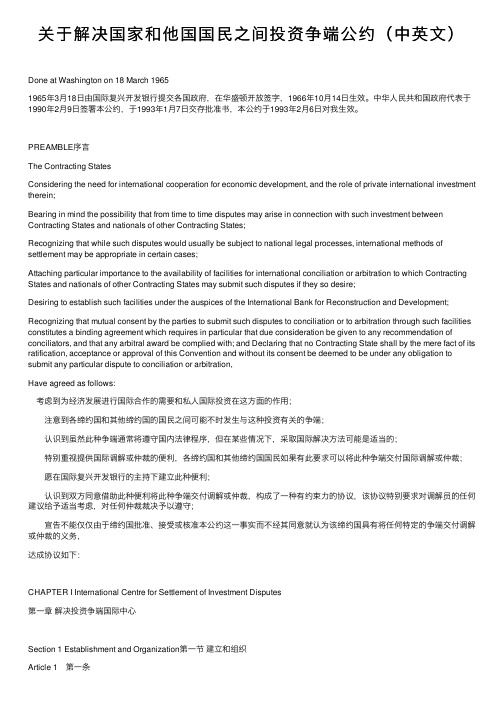
关于解决国家和他国国民之间投资争端公约(中英⽂)Done at Washington on 18 March 19651965年3⽉18⽇由国际复兴开发银⾏提交各国政府,在华盛顿开放签字,1966年10⽉14⽇⽣效。
中华⼈民共和国政府代表于1990年2⽉9⽇签署本公约,于1993年1⽉7⽇交存批准书,本公约于1993年2⽉6⽇对我⽣效。
PREAMBLE序⾔The Contracting StatesConsidering the need for international cooperation for economic development, and the role of private international investment therein;Bearing in mind the possibility that from time to time disputes may arise in connection with such investment between Contracting States and nationals of other Contracting States;Recognizing that while such disputes would usually be subject to national legal processes, international methods of settlement may be appropriate in certain cases;Attaching particular importance to the availability of facilities for international conciliation or arbitration to which Contracting States and nationals of other Contracting States may submit such disputes if they so desire;Desiring to establish such facilities under the auspices of the International Bank for Reconstruction and Development; Recognizing that mutual consent by the parties to submit such disputes to conciliation or to arbitration through such facilities constitutes a binding agreement which requires in particular that due consideration be given to any recommendation of conciliators, and that any arbitral award be complied with; and Declaring that no Contracting State shall by the mere fact of its ratification, acceptance or approval of this Convention and without its consent be deemed to be under any obligation to submit any particular dispute to conciliation or arbitration,Have agreed as follows: 考虑到为经济发展进⾏国际合作的需要和私⼈国际投资在这⽅⾯的作⽤; 注意到各缔约国和其他缔约国的国民之间可能不时发⽣与这种投资有关的争端; 认识到虽然此种争端通常将遵守国内法律程序,但在某些情况下,采取国际解决⽅法可能是适当的; 特别重视提供国际调解或仲裁的便利,各缔约国和其他缔约国国民如果有此要求可以将此种争端交付国际调解或仲裁; 愿在国际复兴开发银⾏的主持下建⽴此种便利; 认识到双⽅同意借助此种便利将此种争端交付调解或仲裁,构成了⼀种有约束⼒的协议,该协议特别要求对调解员的任何建议给予适当考虑,对任何仲裁裁决予以遵守; 宣告不能仅仅由于缔约国批准、接受或核准本公约这⼀事实⽽不经其同意就认为该缔约国具有将任何特定的争端交付调解或仲裁的义务,达成协议如下:CHAPTER I International Centre for Settlement of Investment Disputes第⼀章解决投资争端国际中⼼Section 1 Establishment and Organization第⼀节建⽴和组织Article 1 第⼀条(1) There is hereby established the International Centre for Settlement of Investment Disputes (hereinafter called the Centre).(2) The purpose of the Centre shall be to provide facilities for conciliation and arbitration of investment disputes between Contracting States and nationals of other Contracting States in accordance with the provisions of this Convention. ⼀、兹建⽴解决投资争端国际中⼼(以下简称“中⼼”)。
《关于争端解决规则与程序的谅解》内容

《关于争端解决规则与程序的谅解》内容下载温馨提示:该文档是我店铺精心编制而成,希望大家下载以后,能够帮助大家解决实际的问题。
文档下载后可定制随意修改,请根据实际需要进行相应的调整和使用,谢谢!并且,本店铺为大家提供各种各样类型的实用资料,如教育随笔、日记赏析、句子摘抄、古诗大全、经典美文、话题作文、工作总结、词语解析、文案摘录、其他资料等等,如想了解不同资料格式和写法,敬请关注!Download tips: This document is carefully compiled by the editor. I hope that after you download them, they can help you solve practical problems. The document can be customized and modified after downloading, please adjust and use it according to actual needs, thank you!In addition, our shop provides you with various types of practical materials, such as educational essays, diary appreciation, sentence excerpts, ancient poems, classic articles, topic composition, work summary, word parsing, copy excerpts, other materials and so on, want to know different data formats and writing methods, please pay attention!深入探讨《关于争端解决规则与程序的谅解》引言《关于争端解决规则与程序的谅解》是国际关系领域中一项重要文件,其内容涵盖了争端解决的基本原则、程序和相关规定。
DSU与区域贸易争端解决机制的法律适用

DSU与区域贸易争端解决机制的法律适用作者:于洪泉祖月来源于:2006年第五届WTO与中国国际学术年会优秀论文奖【内容摘要】我国入世五年间,经济全球化使得世界贸易发生了巨大的变化,并且呈现出:国别贸易——WTO成员之间贸易——区域经济组织内部贸易的新格局。
在此基础上,国别之间、区际之间、区域之间贸易摩擦的形式和内容,以及解决贸易纠纷的方式和程序,也有了新的发展。
本文仅就如何掌握WTO的《争端解决谅解》(DSU),并在此框架下充分适用区域贸易争端解决机制,提出几点看法,以求共识。
【关键词】世界贸易组织;区域经济一体化;争端解决谅解;争端解决机制一、WTO与DSU有人说:在21世纪的国际经贸舞台上,不加入WTO将在世界贸易中出局;加入WTO后,不参与区域经济一体化,将被世界贸易边缘化;加入世界贸易、区域经济一体化,而不会运用贸易救济措施和争端解决的方法,同样将被国际市场的强者所取代。
(一)关于DSU的法律规定《关于争端解决规则与程序的谅解》(Understanding on Rules and Procedures Governing the Settlement of Disputes,DSU),简称《争端解决谅解》。
它是在《关税与贸易总协定》(General Agreement on Tariff and Trade,GATT)1979年通过的《关于通知、磋商、争端解决和监督的谅解》的基础上修改的,共27条和4个附件。
主要条款有:范围和适用,管理,总则,磋商,斡旋、调解和调停,专家组,多个起诉方的程序,第三方,寻求信息的权利,机密性,中期审议阶段,专家组报告的通过,上诉机构,争端解决机构决定的时限,对执行建议和裁决的监督,补偿和中止减让,多边体制的加强,涉及最不发达国家成员的特殊程序,仲裁,非违反起诉等条款。
WTO争端解决机制,是解决成员政府间已发生贸易争端的事后解决机制,它使有关成员之间的利益和义务的平衡,避免采取歧视性的贸易限制措施,是保护和加强多边贸易体制稳定性和可预见性的关键因素,是WTO正常运行的重要保障。
英文和解协议4篇
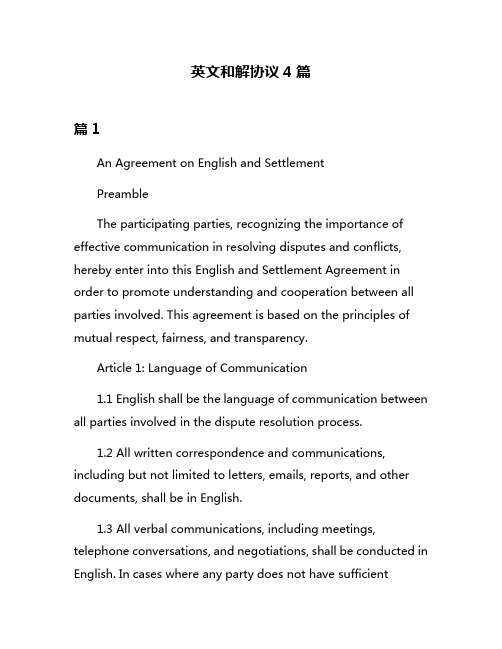
英文和解协议4篇篇1An Agreement on English and SettlementPreambleThe participating parties, recognizing the importance of effective communication in resolving disputes and conflicts, hereby enter into this English and Settlement Agreement in order to promote understanding and cooperation between all parties involved. This agreement is based on the principles of mutual respect, fairness, and transparency.Article 1: Language of Communication1.1 English shall be the language of communication between all parties involved in the dispute resolution process.1.2 All written correspondence and communications, including but not limited to letters, emails, reports, and other documents, shall be in English.1.3 All verbal communications, including meetings, telephone conversations, and negotiations, shall be conducted in English. In cases where any party does not have sufficientproficiency in English, interpretation services shall be provided as necessary.Article 2: Confidentiality2.1 All communications and information exchanged between the parties during the dispute resolution process shall be treated as confidential and shall not be disclosed to any third party without the consent of all parties involved.2.2 Any documents or information shared during the dispute resolution process shall be used solely for the purpose of resolving the dispute and shall not be used for any other purpose.Article 3: Mediation and Arbitration3.1 In the event of a dispute or conflict between the parties, the parties agree to first attempt to resolve the dispute through mediation. If mediation is unsuccessful, the parties agree to submit the dispute to binding arbitration.3.2 Any mediation or arbitration proceedings shall be conducted in English, and all agreements or awards shall be written in English.Article 4: Settlement Agreement4.1 Any settlement agreement reached between the parties shall be in writing and shall be executed in English.4.2 The settlement agreement shall clearly outline the terms and conditions of the settlement, including any financial compensation, obligations, or other remedies agreed upon by the parties.4.3 Once the settlement agreement is signed by all parties, it shall be considered legally binding and enforceable.Article 5: Amendments and Termination5.1 This Agreement may only be amended by the written consent of all parties involved.5.2 This Agreement may be terminated by any party with written notice to all other parties, provided that all ongoing disputes or conflicts are resolved or concluded.ConclusionIn signing this English and Settlement Agreement, the participating parties affirm their commitment to resolving disputes and conflicts in a fair and transparent manner. By agreeing to communicate in English and follow the procedures outlined in this Agreement, the parties demonstrate theirwillingness to cooperate and find mutually acceptable solutions to any disagreements that may arise.篇2A peace agreement, also known as a peace treaty or peace accord, is an agreement between two or more parties to end a conflict or war and establish peace. These agreements are often negotiated through diplomatic means and can involve various terms and conditions to ensure that peace is maintained in the long term. One type of peace agreement is a ceasefire, which is an agreement to stop fighting for a specified period of time.English and peace agreements have a long history together, as many of the most well-known peace agreements in history have been written in English. This is due in part to the fact that English is widely spoken and understood around the world, making it an ideal language for negotiating agreements between parties from different countries.One of the most famous peace agreements in history is the Treaty of Versailles, which ended World War I and was signed in 1919. This agreement, written in both English and French, imposed heavy penalties on Germany and established theLeague of Nations, an international organization aimed at preventing future conflicts.Another important peace agreement written in English is the Good Friday Agreement, which was signed in 1998 and effectively ended the conflict in Northern Ireland known as "The Troubles." This agreement established a power-sharing government in Northern Ireland and addressed issues such as the decommissioning of weapons and the release of prisoners.In recent years, there have been many English-language peace agreements signed around the world, including the Paris Agreement on climate change and the Iran nuclear deal. These agreements show the importance of English as a language of diplomacy and peace-making.Overall, English and peace agreements go hand in hand, as the language is essential for negotiating and implementing agreements that help to end conflicts and establish peace. As the world continues to face challenges such as war, terrorism, and environmental degradation, the importance of English in peace agreements will only continue to grow.篇3英文和解协议英文和解协议(Settlement Agreement)是一种通过协商达成的解决纠纷的法律文件。
和解协议书英语
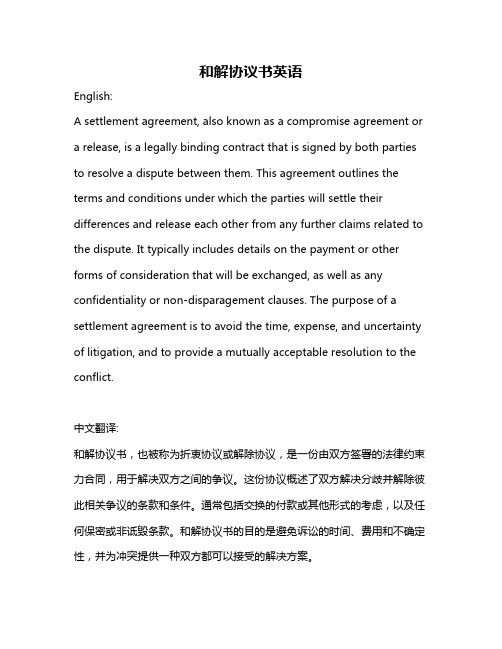
和解协议书英语English:A settlement agreement, also known as a compromise agreement or a release, is a legally binding contract that is signed by both parties to resolve a dispute between them. This agreement outlines the terms and conditions under which the parties will settle their differences and release each other from any further claims related to the dispute. It typically includes details on the payment or other forms of consideration that will be exchanged, as well as any confidentiality or non-disparagement clauses. The purpose of a settlement agreement is to avoid the time, expense, and uncertainty of litigation, and to provide a mutually acceptable resolution to the conflict.中文翻译:和解协议书,也被称为折衷协议或解除协议,是一份由双方签署的法律约束力合同,用于解决双方之间的争议。
这份协议概述了双方解决分歧并解除彼此相关争议的条款和条件。
通常包括交换的付款或其他形式的考虑,以及任何保密或非诋毁条款。
和解协议书的目的是避免诉讼的时间、费用和不确定性,并为冲突提供一种双方都可以接受的解决方案。
关于合同纠纷调解的函

关于合同纠纷调解的函英文回答:Dispute Resolution and Mediation in Contractual Disputes.Mediation as a Dispute Resolution Mechanism.Mediation is a form of alternative dispute resolution (ADR) that involves the use of a neutral third party to facilitate communication and negotiation between disputing parties. In the context of contractual disputes, mediation can be an effective means of resolving disputes amicably and efficiently without resorting to costly and time-consuming litigation.Advantages of Mediation.Mediation offers several advantages over traditional litigation:Confidentiality: Mediation proceedings are typically confidential, which can be particularly important in sensitive or high-profile disputes.Flexibility: The mediation process is flexible and tailored to the specific needs of the parties involved.Cost-effectiveness: Mediation is often less expensive than litigation and can save significant time and resources.Preservation of Relationships: Mediation can help preserve relationships between the parties, as it encourages open and honest communication.Higher Settlement Rates: Mediation has a higher settlement rate than litigation, as it provides astructured environment for negotiation and compromise.Process of Mediation in Contractual Disputes.Typically, mediation in contractual disputes involvesthe following steps:1. Initial Contact: The parties contact the mediator to initiate the mediation process.2. Scheduling: The mediator schedules the mediation session and provides the parties with the necessary information.3. Pre-Mediation Preparation: The parties prepare for the mediation session by gathering relevant documents and information.4. Mediation Session: The parties meet with the mediator to discuss the issues in dispute, explore settlement options, and negotiate a mutually acceptable resolution.5. Settlement Agreement: If the parties reach a settlement, they document it in a written settlement agreement.Role of the Mediator.The mediator plays a crucial role in facilitating the mediation process. The mediator is typically an experienced legal professional or a skilled mediator who is trained in conflict resolution techniques. The mediator's primary responsibilities include:Impartiality: The mediator must remain impartial and unbiased throughout the process.Confidentiality: The mediator must maintain the confidentiality of all information disclosed during the mediation session.Facilitation: The mediator helps the parties communicate effectively, explore settlement options, and negotiate a fair and reasonable outcome.Evaluation: The mediator may provide an evaluation of the case to assist the parties in making informed decisions.中文回答:合同纠纷调解。
英语治安调解协议书模版
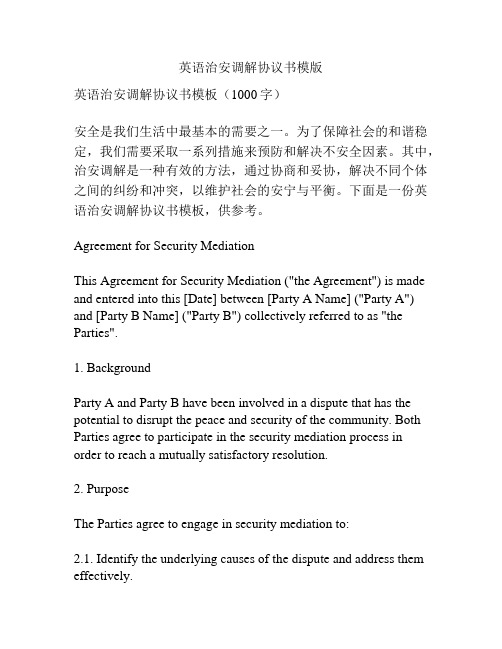
英语治安调解协议书模版英语治安调解协议书模板(1000字)安全是我们生活中最基本的需要之一。
为了保障社会的和谐稳定,我们需要采取一系列措施来预防和解决不安全因素。
其中,治安调解是一种有效的方法,通过协商和妥协,解决不同个体之间的纠纷和冲突,以维护社会的安宁与平衡。
下面是一份英语治安调解协议书模板,供参考。
Agreement for Security MediationThis Agreement for Security Mediation ("the Agreement") is made and entered into this [Date] between [Party A Name] ("Party A") and [Party B Name] ("Party B") collectively referred to as "the Parties".1. BackgroundParty A and Party B have been involved in a dispute that has the potential to disrupt the peace and security of the community. Both Parties agree to participate in the security mediation process in order to reach a mutually satisfactory resolution.2. PurposeThe Parties agree to engage in security mediation to:2.1. Identify the underlying causes of the dispute and address them effectively.2.2. Establish clear lines of communication between the Parties to ensure effective dialogue and understanding.2.3. Develop a solution that respects the rights and interests of all Parties involved.3. Mediation Process3.1. The Parties agree to meet with a neutral and trained mediator who will facilitate the communication and negotiation process.3.2. The mediator will create a safe environment for open and respectful dialogue between the Parties.3.3. Each Party agrees to participate in the mediation process in good faith, actively listening and engaging in constructive discussions.3.4. All mediation sessions will be confidential and without prejudice, unless otherwise agreed upon by the Parties.4. Mediation Guidelines4.1. Respect: The Parties commit to treating each other with respect and courtesy throughout the mediation process.4.2. Active Listening: The Parties agree to listen attentively to each other's perspectives and to refrain from interrupting or dismissing the other party's viewpoint.4.3. Confidentiality: The Parties acknowledge that all discussions and information shared during the mediation sessions will be considered confidential and will not be disclosed to any third party, except as required by law.4.4. Good Faith: The Parties will approach the mediation process in good faith, meaning that they will make genuine efforts to reacha mutually satisfactory resolution.5. Resolution5.1. The Parties acknowledge that the mediator does not have the power to impose a solution but will assist the Parties in reaching a voluntary agreement.5.2. If the Parties reach a mutually satisfactory resolution, it will be documented in writing and signed by all Parties.5.3. The Parties agree to abide by the terms of the resolution and to work together to ensure its successful implementation.5.4. If the Parties are unable to reach a resolution through mediation, they reserve the right to pursue alternative legal means to resolve the dispute.。
究纷协议书简单版本
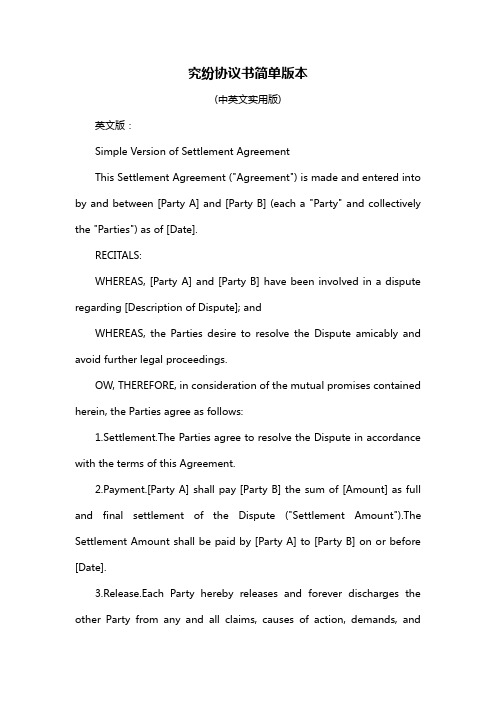
究纷协议书简单版本(中英文实用版)英文版:Simple Version of Settlement AgreementThis Settlement Agreement ("Agreement") is made and entered into by and between [Party A] and [Party B] (each a "Party" and collectively the "Parties") as of [Date].RECITALS:WHEREAS, [Party A] and [Party B] have been involved in a dispute regarding [Description of Dispute]; andWHEREAS, the Parties desire to resolve the Dispute amicably and avoid further legal proceedings.OW, THEREFORE, in consideration of the mutual promises contained herein, the Parties agree as follows:1.Settlement.The Parties agree to resolve the Dispute in accordance with the terms of this Agreement.2.Payment.[Party A] shall pay [Party B] the sum of [Amount] as full and final settlement of the Dispute ("Settlement Amount").The Settlement Amount shall be paid by [Party A] to [Party B] on or before [Date].3.Release.Each Party hereby releases and forever discharges the other Party from any and all claims, causes of action, demands, andliabilities, known or unknown, arising out of or in any way connected to the Dispute.4.Confidentiality.The terms and conditions of this Agreement shall be treated as confidential and shall not be disclosed by either Party to any third party except as may be required by law or legal process.erning Law.This Agreement shall be governed by and construed in accordance with the laws of [Jurisdiction].6.Entire Agreement.This Agreement constitutes the entire agreement between the Parties and supersedes all prior agreements and understandings, both written and oral, relating to the subject matter hereof.IN WITNESS WHEREOF, the Parties have executed this Settlement Agreement as of the date first above written.[Party A]:[Signature][Name][Date][Party B]:[Signature][Name][Date]中文版:简易和解协议书本和解协议书(以下简称“本协议”)由[甲方] 和[乙方] (每方称为“一方”或合称为“各方”)于[日期] 订立。
- 1、下载文档前请自行甄别文档内容的完整性,平台不提供额外的编辑、内容补充、找答案等附加服务。
- 2、"仅部分预览"的文档,不可在线预览部分如存在完整性等问题,可反馈申请退款(可完整预览的文档不适用该条件!)。
- 3、如文档侵犯您的权益,请联系客服反馈,我们会尽快为您处理(人工客服工作时间:9:00-18:30)。
ANNEX 2UNDERSTANDING ON RULES AND PROCEDURESGOVERNING THE SETTLEMENT OF DISPUTESMembers hereby agree as follows:Article 1Coverage and Application1. The rules and procedures of this Understanding shall apply to disputes brought pursuant to the consultation and dispute settlement provisions of the agreements listed in Appendix 1 to this Understanding (referred to in this Understanding as the "covered agreements"). The rules and procedures of this Understanding shall also apply to consultations and the settlement of disputes between Members concerning their rights and obligations under the provisions of the Agreement Establishing the World Trade Organization (referred to in this Understanding as the "WTO Agreement") and of this Understanding taken in isolation or in combination with any other covered agreement.2. The rules and procedures of this Understanding shall apply subject to such special or additional rules and procedures on dispute settlement contained in the covered agreements as are identified in Appendix 2 to this Understanding. To the extent that there is a difference between the rules and procedures of this Understanding and the special or additional rules and procedures set forth in Appendix 2, the special or additional rules and procedures in Appendix 2 shall prevail. In disputes involving rules and procedures under more than one covered agreement, if there is a conflict between special or additional rules and procedures of such agreements under review, and where the parties to the dispute cannot agree on rules and procedures within 20 days of the establishment of the panel, the Chairman of the Dispute Settlement Body provided for in paragraph 1 of Article 2 (referred to in this Understanding as the "DSB"), in consultation with the parties to the dispute, shall determine the rules and procedures to be followed within 10 days after a request by either Member. The Chairman shall be guided by the principle that special or additional rules and procedures should be used where possible, and the rules and procedures set out in this Understanding should be used to the extent necessary to avoid conflict.Article 2Administration1. The Dispute Settlement Body is hereby established to administer these rules and procedures and, except as otherwise provided in a covered agreement, the consultation and dispute settlement provisions of the covered agreements. Accordingly, the DSB shall have the authority to establish panels, adopt panel and Appellate Body reports, maintain surveillance ofimplementation of rulings and recommendations, and authorize suspension of concessions andother obligations under the covered agreements. With respect to disputes arising under a covered agreement which is a Plurilateral Trade Agreement, the term "Member" as used herein shall refer only to those Members that are parties to the relevant Plurilateral Trade Agreement. Where the DSB administers the dispute settlement provisions of a Plurilateral Trade Agreement, only those Members that are parties to that Agreement may participate in decisionsor actions taken by the DSB with respect to that dispute.2. The DSB shall inform the relevant WTO Councils and Committees of any developments in disputes related to provisions of the respective covered agreements.3. The DSB shall meet as often as necessary to carry out its functions within the time-frames provided in this Understanding.4. Where the rules and procedures of this Understanding provide for the DSB to take a decision, it shall do so by consensus.Article 3General Provisions1. Members affirm their adherence to the principles for the management of disputes heretofore applied under Articles XXII and XXIII of GATT 1947, and the rules and procedures as further elaborated and modified herein.2. The dispute settlement system of the WTO is a central element in providing security and predictability to the multilateral trading system. The Members recognize that it serves to preserve the rights and obligations of Members under the covered agreements, and to clarifythe existing provisions of those agreements in accordance with customary rules ofinterpretation of public international law. Recommendations and rulings of the DSB cannot addto or diminish the rights and obligations provided in the covered agreements.3. The prompt settlement of situations in which a Member considers that any benefits accruingto it directly or indirectly under the covered agreements are being impaired by measures taken by another Member is essential to the effective functioning of the WTO and the maintenance ofa proper balance between the rights and obligations of Members.4. Recommendations or rulings made by the DSB shall be aimed at achieving a satisfactory settlement of the matter in accordance with the rights and obligations under this Understanding and under the covered agreements.5. All solutions to matters formally raised under the consultation and dispute settlement provisions of the covered agreements, including arbitration awards, shall be consistent withthose agreements and shall not nullify or impair benefits accruing to any Member under those agreements, nor impede the attainment of any objective of those agreements.6. Mutually agreed solutions to matters formally raised under the consultation and dispute settlement provisions of the covered agreements shall be notified to the DSB and the relevant Councils and Committees, where any Member may raise any point relating thereto.7. Before bringing a case, a Member shall exercise its judgement as to whether action under these procedures would be fruitful. The aim of the dispute settlement mechanism is to secure a positive solution to a dispute. A solution mutually acceptable to the parties to a dispute and consistent with the covered agreements is clearly to be preferred. In the absence of a mutually agreed solution, the first objective of the dispute settlement mechanism is usually to secure the withdrawal of the measures concerned if these are found to be inconsistent with the provisions of any of the covered agreements. The provision of compensation should be resorted to only if the immediate withdrawal of the measure is impracticable and as a temporary measure pending the withdrawal of the measure which is inconsistent with a covered agreement. The last resort which this Understanding provides to the Member invoking the dispute settlement procedures is the possibility of suspending the application of concessions or other obligations under the covered agreements on a discriminatory basis vis-à-vis the other Member, subject to authorization by the DSB of such measures.8. In cases where there is an infringement of the obligations assumed under a covered agreement, the action is considered prima facie to constitute a case of nullification or impairment. This means that there is normally a presumption that a breach of the rules has an adverse impact on other Members parties to that covered agreement, and in such cases, it shall be up to the Member against whom the complaint has been brought to rebut the charge.9. The provisions of this Understanding are without prejudice to the rights of Members to seek authoritative interpretation of provisions of a covered agreement through decision-making under the WTO Agreement or a covered agreement which is a Plurilateral Trade Agreement.10. It is understood that requests for conciliation and the use of the dispute settlement procedures should not be intended or considered as contentious acts and that, if a dispute arises, all Members will engage in these procedures in good faith in an effort to resolve the dispute. It is also understood that complaints and counter-complaints in regard to distinct matters should not be linked.11. This Understanding shall be applied only with respect to new requests for consultations under the consultation provisions of the covered agreements made on or after the date of entry into force of the WTO Agreement. With respect to disputes for which the request for consultations was made under GATT 1947 or under any other predecessor agreement to the covered agreements before the date of entry into force of the WTO Agreement, the relevant disputesettlement rules and procedures in effect immediately prior to the date of entry into force of the WTO Agreement shall continue to apply.12. Notwithstanding paragraph 11, if a complaint based on any of the covered agreements is brought by a developing country Member against a developed country Member, the complaining party shall have the right to invoke, as an alternative to the provisions contained inArticles 4, 5, 6 and 12 of this Understanding, the corresponding provisions of the Decision of 5 April 1966 (BISD 14S/18), except that where the Panel considers that the time-frame provided for in paragraph 7 of that Decision is insufficient to provide its report and with the agreement of the complaining party, that time-frame may be extended. To the extent that there is a difference between the rules and procedures of Articles 4, 5, 6 and 12 and the corresponding rules and procedures of the Decision, the latter shall prevail.Article 4Consultations1. Members affirm their resolve to strengthen and improve the effectiveness of the consultation procedures employed by Members.2. Each Member undertakes to accord sympathetic consideration to and afford adequate opportunity for consultation regarding any representations made by another Member concerning measures affecting the operation of any covered agreement taken within the territory of the former.3. If a request for consultations is made pursuant to a covered agreement, the Member to which the request is made shall, unless otherwise mutually agreed, reply to the request within 10 days after the date of its receipt and shall enter into consultations in good faith within a period of no more than 30 days after the date of receipt of the request, with a view to reaching a mutually satisfactory solution. If the Member does not respond within 10 days after the date of receipt of the request, or does not enter into consultations within a period of no more than 30 days, or a period otherwise mutually agreed, after the date of receipt of the request, then the Member that requested the holding of consultations may proceed directly to request the establishment of a panel.4. All such requests for consultations shall be notified to the DSB and the relevant Councils and Committees by the Member which requests consultations. Any request for consultations shall be submitted in writing and shall give the reasons for the request, including identification of the measures at issue and an indication of the legal basis for the complaint.5. In the course of consultations in accordance with the provisions of a covered agreement, before resorting to further action under this Understanding, Members should attempt to obtain satisfactory adjustment of the matter.6. Consultations shall be confidential, and without prejudice to the rights of any Member in any further proceedings.7. If the consultations fail to settle a dispute within 60 days after the date of receipt of the request for consultations, the complaining party may request the establishment of a panel. The complaining party may request a panel during the 60-day period if the consulting parties jointly consider that consultations have failed to settle the dispute.8. In cases of urgency, including those which concern perishable goods, Members shall enter into consultations within a period of no more than 10 days after the date of receipt of the request. If the consultations have failed to settle the dispute within a period of 20 days after the date of receipt of the request, the complaining party may request the establishment of a panel.9. In cases of urgency, including those which concern perishable goods, the parties to the dispute, panels and the Appellate Body shall make every effort to accelerate the proceedings to the greatest extent possible.10. During consultations Members should give special attention to the particular problems and interests of developing country Members.11. Whenever a Member other than the consulting Members considers that it has a substantial trade interest in consultations being held pursuant to paragraph 1 of Article XXII of GATT 1994, paragraph 1 of Article XXII of GATS, or the corresponding provisions in other covered agreements , such Member may notify the consulting Members and the DSB, within 10 days after the date of the circulation of the request for consultations under said Article, of its desire to be joined in the consultations. Such Member shall be joined in the consultations, provided that the Member to which the request for consultations was addressed agrees that the claim of substantial interest is well-founded. In that event they shall so inform the DSB. If the request to be joined in the consultations is not accepted, the applicant Member shall be free to request consultations under paragraph 1 of Article XXII or paragraph 1 of Article XXIII of GATT 1994, paragraph 1 of Article XXII or paragraph 1 of Article XXIII of GATS, or the corresponding provisions in other covered agreements.Article 5Good Offices, Conciliation and Mediation1. Good offices, conciliation and mediation are procedures that are undertaken voluntarily if the parties to the dispute so agree.2. Proceedings involving good offices, conciliation and mediation, and in particular positions taken by the parties to the dispute during these proceedings, shall be confidential, andwithout prejudice to the rights of either party in any further proceedings under these procedures.3. Good offices, conciliation or mediation may be requested at any time by any party to a dispute. They may begin at any time and be terminated at any time. Once procedures for good offices, conciliation or mediation are terminated, a complaining party may then proceed with a request for the establishment of a panel.4. When good offices, conciliation or mediation are entered into within 60 days after the date of receipt of a request for consultations, the complaining party must allow a period of 60 days after the date of receipt of the request for consultations before requesting the establishment of a panel. The complaining party may request the establishment of a panel during the 60-day period if the parties to the dispute jointly consider that the good offices, conciliation or mediation process has failed to settle the dispute.5. If the parties to a dispute agree, procedures for good offices, conciliation or mediation may continue while the panel process proceeds.6. The Director-General may, acting in an ex officio capacity, offer good offices,conciliation or mediation with the view to assisting Members to settle a dispute.Article 6Establishment of Panels1. If the complaining party so requests, a panel shall be established at the latest at the DSB meeting following that at which the request first appears as an item on the DSB's agenda, unless at that meeting the DSB decides by consensus not to establish a panel.2. The request for the establishment of a panel shall be made in writing. It shall indicate whether consultations were held, identify the specific measures at issue and provide a brief summary of the legal basis of the complaint sufficient to present the problem clearly. In case the applicant requests the establishment of a panel with other than standard terms of reference, the written request shall include the proposed text of special terms of reference.Article 7Terms of Reference of Panels1. Panels shall have the following terms of reference unless the parties to the dispute agree otherwise within 20 days from the establishment of the panel:"To examine, in the light of the relevant provisions in (name of the covered agreement(s)cited by the parties to the dispute), the matter referred to the DSB by (name of party) in document ... and to make such findings as will assist the DSB in making the recommendations or in giving the rulings provided for in that/those agreement(s)."2. Panels shall address the relevant provisions in any covered agreement or agreements citedby the parties to the dispute.3. In establishing a panel, the DSB may authorize its Chairman to draw up the terms of reference of the panel in consultation with the parties to the dispute, subject to the provisions of paragraph 1. The terms of reference thus drawn up shall be circulated to all Members. If other than standard terms of reference are agreed upon, any Member may raise any point relating thereto in the DSB.Article 8Composition of Panels1. Panels shall be composed of well-qualified governmental and/or non-governmental individuals, including persons who have served on or presented a case to a panel, served as arepresentative of a Member or of a contracting party to GATT 1947 or as a representative tothe Council or Committee of any covered agreement or its predecessor agreement, or in the Secretariat, taught or published on international trade law or policy, or served as a senior trade policy official of a Member.2. Panel members should be selected with a view to ensuring the independence of the members, a sufficiently diverse background and a wide spectrum of experience.3. Citizens of Members whose governments are parties to the dispute or third parties asdefined in paragraph 2 of Article 10 shall not serve on a panel concerned with that dispute, unless the parties to the dispute agree otherwise.4. To assist in the selection of panelists, the Secretariat shall maintain an indicative listof governmental and non-governmental individuals possessing the qualifications outlined in paragraph 1, from which panelists may be drawn as appropriate. That list shall include the roster of non-governmental panelists established on 30 November 1984 (BISD 31S/9), and other rosters and indicative lists established under any of the covered agreements, and shall retain the names of persons on those rosters and indicative lists at the time of entry into force of the WTO Agreement. Members may periodically suggest names of governmental and non-governmental individuals for inclusion on the indicative list, providing relevant information on their knowledge of international trade and of the sectors or subject matter of the covered agreements, and those names shall be added to the list upon approval by the DSB. For each ofthe individuals on the list, the list shall indicate specific areas of experience or expertise of the individuals in the sectors or subject matter of the covered agreements.5. Panels shall be composed of three panelists unless the parties to the dispute agree, within 10 days from the establishment of the panel, to a panel composed of five panelists. Members shall be informed promptly of the composition of the panel.6. The Secretariat shall propose nominations for the panel to the parties to the dispute. The parties to the dispute shall not oppose nominations except for compelling reasons.7. If there is no agreement on the panelists within 20 days after the date of theestablishment of a panel, at the request of either party, the Director-General, inconsultation with the Chairman of the DSB and the Chairman of the relevant Council or Committee, shall determine the composition of the panel by appointing the panelists whom the Director-General considers most appropriate in accordance with any relevant special or additional rules or procedures of the covered agreement or covered agreements which are atissue in the dispute, after consulting with the parties to the dispute. The Chairman of the DSB shall inform the Members of the composition of the panel thus formed no later than 10 days after the date the Chairman receives such a request.8. Members shall undertake, as a general rule, to permit their officials to serve as panelists.9. Panelists shall serve in their individual capacities and not as government representatives, nor as representatives of any organization. Members shall therefore not give them instructions nor seek to influence them as individuals with regard to matters before a panel.10. When a dispute is between a developing country Member and a developed country Member the panel shall, if the developing country Member so requests, include at least one panelist froma developing country Member.11. Panelists' expenses, including travel and subsistence allowance, shall be met from the WTO budget in accordance with criteria to be adopted by the General Council, based on recommendations of the Committee on Budget, Finance and Administration.Article 9Procedures for Multiple Complainants1. Where more than one Member requests the establishment of a panel related to the same matter,a single panel may be established to examine these complaints taking into account the rightsof all Members concerned. A single panel should be established to examine such complaints whenever feasible.2. The single panel shall organize its examination and present its findings to the DSB in sucha manner that the rights which the parties to the dispute would have enjoyed had separate panels examined the complaints are in no way impaired. If one of the parties to the dispute so requests, the panel shall submit separate reports on the dispute concerned. The written submissions by each of the complainants shall be made available to the other complainants, and each complainant shall have the right to be present when any one of the other complainants presents its views to the panel.3. If more than one panel is established to examine the complaints related to the same matter, to the greatest extent possible the same persons shall serve as panelists on each of the separate panels and the timetable for the panel process in such disputes shall be harmonized.Article 10Third Parties1. The interests of the parties to a dispute and those of other Members under a covered agreement at issue in the dispute shall be fully taken into account during the panel process.2. Any Member having a substantial interest in a matter before a panel and having notified its interest to the DSB (referred to in this Understanding as a "third party") shall have an opportunity to be heard by the panel and to make written submissions to the panel. These submissions shall also be given to the parties to the dispute and shall be reflected in the panel report.3. Third parties shall receive the submissions of the parties to the dispute to the first meeting of the panel.4. If a third party considers that a measure already the subject of a panel proceedingnullifies or impairs benefits accruing to it under any covered agreement, that Member may have recourse to normal dispute settlement procedures under this Understanding. Such a disputeshall be referred to the original panel wherever possible.Article 11Function of PanelsThe function of panels is to assist the DSB in discharging its responsibilities under this Understanding and the covered agreements. Accordingly, a panel should make an objective assessment of the matter before it, including an objective assessment of the facts of the case and the applicability of and conformity with the relevant covered agreements, and make such other findings as will assist the DSB in making the recommendations or in giving the rulingsprovided for in the covered agreements. Panels should consult regularly with the parties to the dispute and give them adequate opportunity to develop a mutually satisfactory solution.Article 12Panel Procedures1. Panels shall follow the Working Procedures in Appendix 3 unless the panel decides otherwise after consulting the parties to the dispute.2. Panel procedures should provide sufficient flexibility so as to ensure high-quality panel reports, while not unduly delaying the panel process.3. After consulting the parties to the dispute, the panelists shall, as soon as practicable and whenever possible within one week after the composition and terms of reference of the panel have been agreed upon, fix the timetable for the panel process, taking into account the provisions of paragraph 9 of Article 4, if relevant.4. In determining the timetable for the panel process, the panel shall provide sufficient time for the parties to the dispute to prepare their submissions.5. Panels should set precise deadlines for written submissions by the parties and the parties should respect those deadlines.6. Each party to the dispute shall deposit its written submissions with the Secretariat for immediate transmission to the panel and to the other party or parties to the dispute. The complaining party shall submit its first submission in advance of the responding party's first submission unless the panel decides, in fixing the timetable referred to in paragraph 3 and after consultations with the parties to the dispute, that the parties should submit theirfirst submissions simultaneously. When there are sequential arrangements for the deposit of first submissions, the panel shall establish a firm time-period for receipt of the responding party's submission. Any subsequent written submissions shall be submitted simultaneously.7. Where the parties to the dispute have failed to develop a mutually satisfactory solution, the panel shall submit its findings in the form of a written report to the DSB. In such cases, the report of a panel shall set out the findings of fact, the applicability of relevant provisions and the basic rationale behind any findings and recommendations that it makes. Where a settlement of the matter among the parties to the dispute has been found, the report of the panel shall be confined to a brief description of the case and to reporting that a solution has been reached.8. In order to make the procedures more efficient, the period in which the panel shall conduct its examination, from the date that the composition and terms of reference of the panel havebeen agreed upon until the date the final report is issued to the parties to the dispute, shall, as a general rule, not exceed six months. In cases of urgency, including those relating to perishable goods, the panel shall aim to issue its report to the parties to the dispute within three months.9. When the panel considers that it cannot issue its report within six months, or within three months in cases of urgency, it shall inform the DSB in writing of the reasons for the delay together with an estimate of the period within which it will issue its report. In no case should the period from the establishment of the panel to the circulation of the report to the Members exceed nine months.10. In the context of consultations involving a measure taken by a developing country Member, the parties may agree to extend the periods established in paragraphs 7 and 8 of Article 4. If, after the relevant period has elapsed, the consulting parties cannot agree that the consultations have concluded, the Chairman of the DSB shall decide, after consultation withthe parties, whether to extend the relevant period and, if so, for how long. In addition, in examining a complaint against a developing country Member, the panel shall accord sufficient time for the developing country Member to prepare and present its argumentation. Theprovisions of paragraph 1 of Article 20 and paragraph 4 of Article 21 are not affected by any action pursuant to this paragraph.11. Where one or more of the parties is a developing country Member, the panel's report shall explicitly indicate the form in which account has been taken of relevant provisions on differential and more-favourable treatment for developing country Members that form part ofthe covered agreements which have been raised by the developing country Member in the courseof the dispute settlement procedures.12. The panel may suspend its work at any time at the request of the complaining party for a period not to exceed 12 months. In the event of such a suspension, the time-frames set out in paragraphs 8 and 9 of this Article, paragraph 1 of Article 20, and paragraph 4 of Article 21 shall be extended by the amount of time that the work was suspended. If the work of the panel has been suspended for more than 12 months, the authority for establishment of the panel shall lapse.Article 13Right to Seek Information1. Each panel shall have the right to seek information and technical advice from anyindividual or body which it deems appropriate. However, before a panel seeks such informationor advice from any individual or body within the jurisdiction of a Member it shall inform the authorities of that Member. A Member should respond promptly and fully to any request by a。
